Notice a squealing noise or grinding sound when applying pressure to the brake pedal after installing new brake pads and rotors?
If your brakes are grinding after installing new pads and rotors, the reasons could include a thin layer of rust due to moisture, a difference in metallurgy at the surface of the brake pad, lack of lubrication on the contact points on the brake calipers, and misaligned brake clips.
In most cases, after driving for a few hundred miles, the new brakes will have quietened.
Keep reading to learn more about the possible causes for brake grinding after installing new pads and rotors.
We'll discuss ways to stop new brakes from grinding, safety factors, and more, so let's get into it!
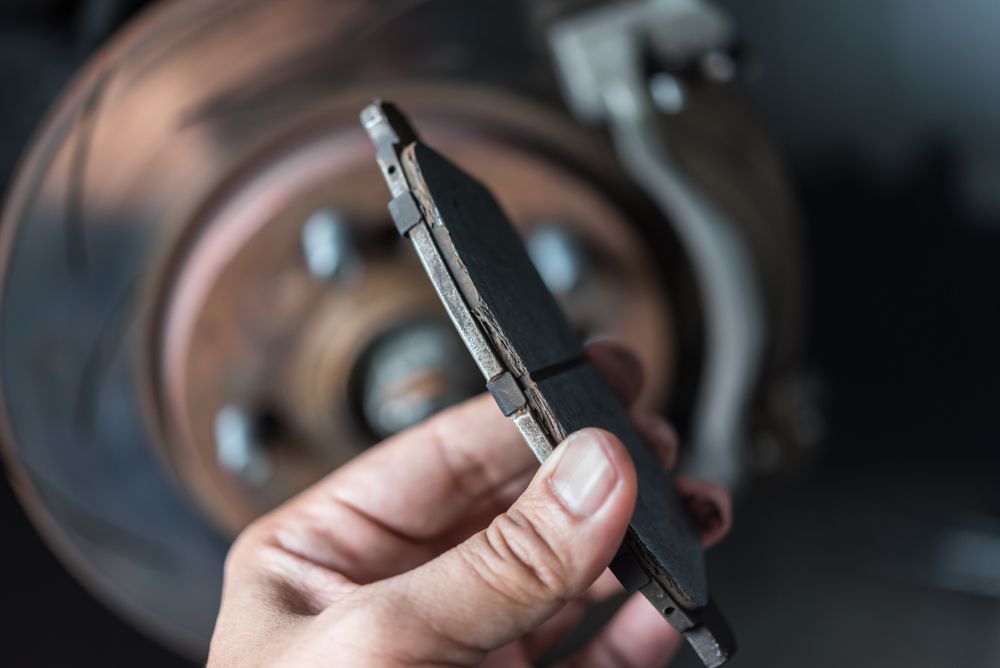 Worn brake pads, like the one shown here, can cause brakes to grind or squeal
Worn brake pads, like the one shown here, can cause brakes to grind or squeal
Why Are My New Brakes Grinding When I Stop?
There are several reasons that new brakes may start making a grinding noise when you come to a stop, including the following:
- Rust: when brake pads have sat for a time, they will develop a thin layer of rust (oxidation) that will lead to noisy brakes until the rust is worn away. This is not unique to new brakes and will clear itself up quickly in most cases.
- Metallurgy: the makeup of the metallurgy on the surface of a brake pad can be slightly different, with tighter fibers, than the rest of the brake pad. This can make a squealing noise or grinding sound until the pad's surface has been worn away.
- Poor lubrication: there needs to be sufficient lubrication where a brake pad and brake caliper are connected—one of the purposes of this lubrication is to reduce the vibration that can cause brake noise.
- Poor quality brakes: cheap or low-quality brake pads can lead to a loud grinding sound, among other problems. It's best to pay the small difference for high-quality pads that will last longer, stop better, and make less noise.
- Other worn-out parts: even though the brakes are new, other parts (like the shims, wheel bearings, rotor discs, and brake drums) may need to be repaired
- Misaligned components: a brake spring could be misaligned, leading to excessive vibrations
- Debris stuck between the rotor and brake pad: if small pebbles, rocks, dirt, mud, or other debris get caught between these two parts, you'll likely experience grinding noises when you brake. You can usually fix this by reversing 50-100 feet to allow the debris to exit the way it came in.
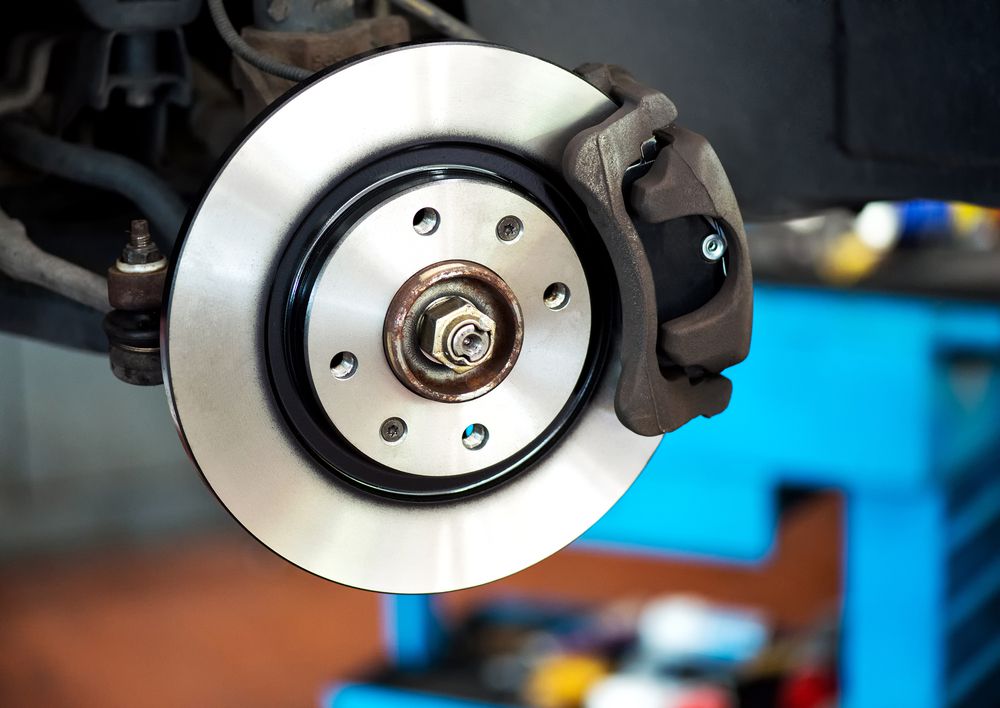 New brake assembly - rotor, pad, and caliper
New brake assembly - rotor, pad, and caliper
How Do You Fix A Grinding Noise In Brakes?
The fix for grinding brakes depends on the root cause.
You can first try to drive in reverse for 50 to 100 feet. Occasionally a rock or pebble can find a way between the brake pad and the rotor. By reversing, you may get the rock to exit the same way it got stuck.
Try cleaning your brakes with brake cleaner to remove debris.
If the brake pads are old, it may be time for a replacement. Brake pads have wear indicators that are designed to make a noise when they wear out. Not replacing your brake pads when needed is a safety risk and will damage the rotors.
Lubricate dry components. If parts like brake caliper bolts are insufficiently lubricated, the brakes may not fully release, causing a grinding noise.
Get a mechanic to diagnose the problem. If the problem is none of the above, it points to a more complicated problem.
Temporary Fix For Grinding Brakes
There aren't really any cheap temporary fixes when it comes to fixing grinding brakes, as mechanical problems usually cause them.
A mechanical problem will have to be fixed permanently; however, many permanent fixes can be relatively inexpensive.
As mentioned, the most common cause of grinding brakes is when rocks and pebbles get lodged between the brake pads and rotors. By reversing the vehicle a short distance, you can allow the debris to work itself free by exiting the way it entered.
Will Brake Cleaner Stop Grinding?
Depending on the source of the brake grinding problem, a quality brake cleaner could be a good solution.
For example, you could use a cleaner if the problem arises from grinding or friction from a drum, caliper, lining, shoe, or pad.
Keep in mind, though, that if your problem is related to parts being too old, worn out, or in need of resurfacing, the brake cleaner can only do so much and might not stop the grinding noises.
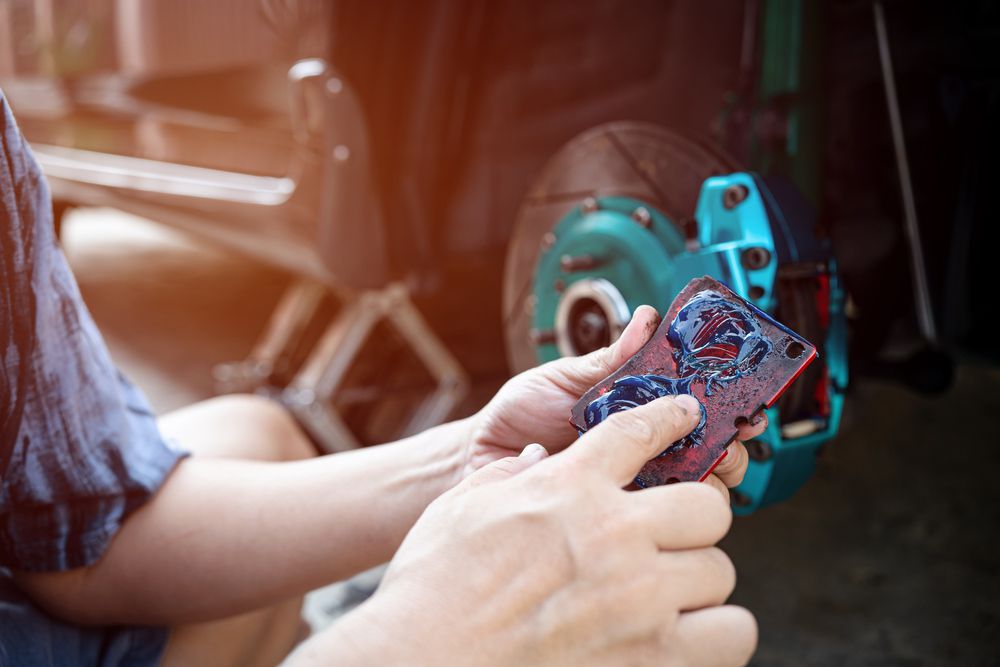 Applying anti-sieze grease to a brake caliper will reduce vibrations and sticky components that can make a grinding noise.
Applying anti-sieze grease to a brake caliper will reduce vibrations and sticky components that can make a grinding noise.
Is It Safe To Drive When Brakes Are Grinding?
Generally, it's not a good idea to keep driving when you hear your brakes making grinding noises.
Grinding noises from your brakes are a symptom of a mechanical problem that may be serious.
Often the noise is due to the brake pad indicators signifying worn-out brake pads. Driving on worn-out brake pads leads to damaged rotors which are much more expensive to fix than just pads.
If your brakes are grinding, getting them looked at as soon as possible is safest.
How Should Brakes Feel After Being Replaced?
After successfully replacing your brakes, they should ideally feel firm when you drive.
And as you apply more pressure to your new brakes, they should increase their feeling of firmness.
Remember that brand new brakes - even the best ones accompanied by other brand new parts - may grind before they're fully broken in.
If you notice that the braking feels bumpy or squeaky, it may be that your new brakes weren't aligned or lubricated properly by the mechanic who installed them.
And if they feel at all "spongy," it may be that there is a problem like air in the brake lines that can be fixed by bleeding the brakes.
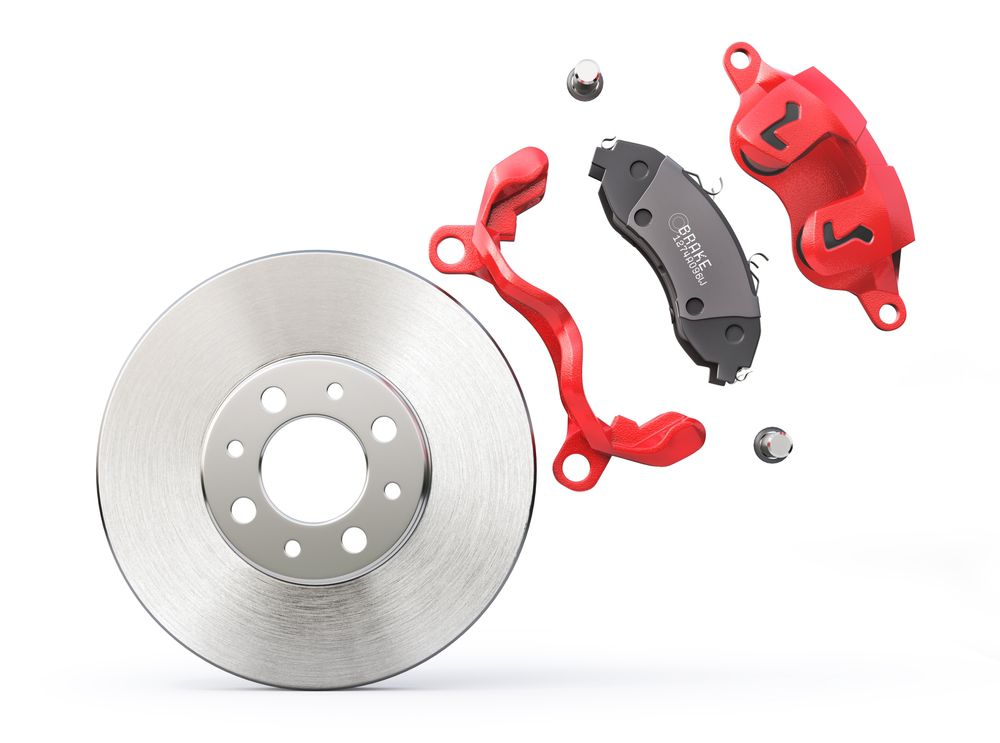 Rotor (grey metal), brake caliper (red), pad (dark grey metal)
Rotor (grey metal), brake caliper (red), pad (dark grey metal)
How Long Does It Take For Brakes To Break In?
Brakes are typically considered completely broken in after about 300-400 miles of everyday driving.
Take it easy for the first 100 miles; your brakes should be good to go, although some automotive brake professionals recommend a break-in procedure.
You should note that the critical part of "bedding" or breaking in new brakes is to do so patiently and slowly.
Bedding is simply the process of heating and cooling the brakes in a controlled manner.
How Do You Break In New Rotors?
The process for breaking in brakes often referred to as "bedding," is a procedure that prevents the uneven distribution of brake pad material from being applied to the rotor.
You may have noticed that used rotors have a blue glossy finish, known as "pad transfer," on their contact surface.
This pad transfer is actually brake pad material deposited onto the rotor due to heat and friction during the braking process.
This pad transfer material improves braking by adding friction to the smooth rotor surface.
The process for breaking in brakes often referred to as "bedding," is a procedure that prevents the uneven distribution of brake pad material from being applied to the rotor.
You may have noticed that used rotors have a blue glossy finish, known as "pad transfer," on their contact surface.
This pad transfer is actually brake pad material deposited onto the rotor due to heat and friction during the braking process.
This pad transfer material improves braking by adding friction to the smooth rotor surface.
If you initially run the brakes too hot, then park the vehicle without letting the pads gradually cool; the melted pads will cool in one spot on the rotor leaving an uneven distribution of pad material, which will lead to a pulsing phenomenon and uncomfortable driving experience.
So anyway, you may still wonder how you can properly break in your new brake parts.
One of the best techniques involves a special speed, timing, and brake pressure ratio.
Here's how you can break in new brake rotors:
- Drive at an even speed of 30 mph
- Complete gradual stops using your brakes (30 consecutive stops)
- After each stop, wait about half a minute to let the brakes cool before accelerating again.
As you break in your rotors with this method, you prevent unnecessary and harmful overheating of your brake pads.
Another method you may use to break in your brakes is to drive at about 60 mph and use your brakes to slow down to about 20-25 mph.
You don't come to a full stop, but you will complete this brake application ten times consecutively.
Once you're done with this method, speed up again and drive at a steady speed to allow the rotors to cool off.
Additionally, as a rule of thumb, you should try not to come to quick, halting stops in the first few hundred miles of using your new brakes.
This means you may need to drive more defensively than you usually do to avoid abrupt stops.
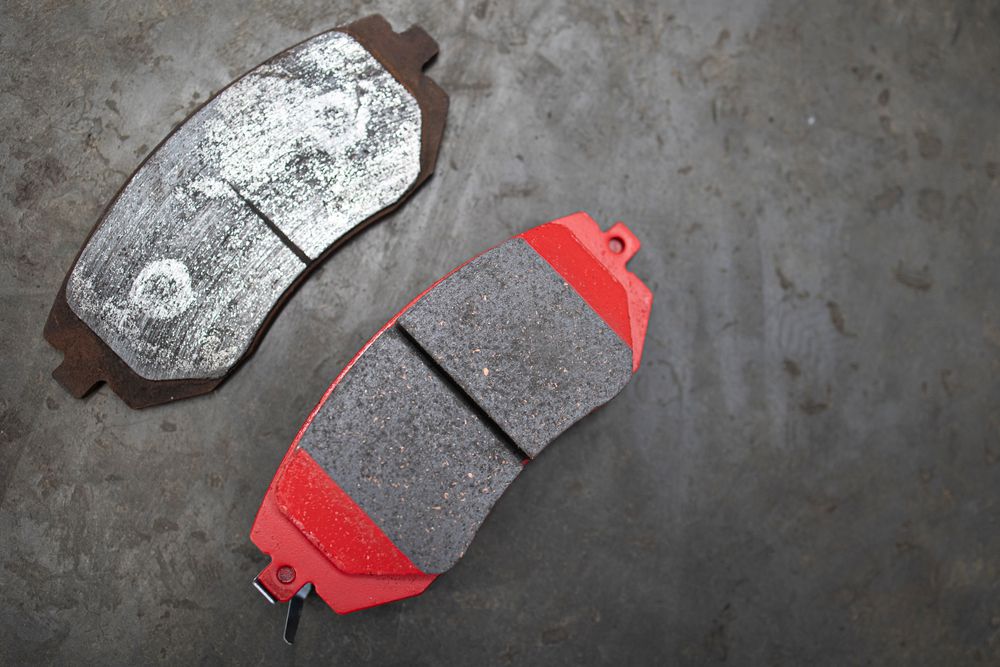 Worn vs. new brake pad
Worn vs. new brake pad
Conclusion
Have you ever wondered why are my brakes grinding after new pads and rotors?
If your brakes are grinding after new brake pads and rotors, they probably just need some more miles to break in.
However, occasionally debris can get caught between the brake pads and rotors, causing a grating or grinding noise. Back up a short distance to rule out debris or release whatever is caught up.
References
www.counterman.com
www.tirerack.com
www.autovfix.com
www.quora.com
www.arstechnica.com